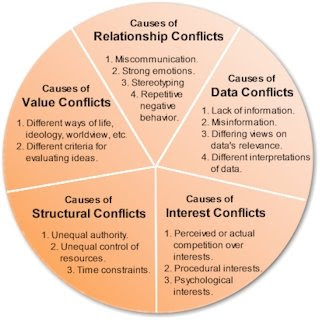
Stop reading for a moment and make a list of as many different conflicts as you can think of. Include conflicts that you've experienced personally and those that involve the others.
Sometimes there's angry shouting like when parents yell at their children.
In other words, conflict involves restrained discussion, as in labor-management negotiations or court trials. Sometimes conflict are carried on through hostile silence, as in the unspoken feuds of angry couples. Finally conflicts may wind up in physical fighting between friends, enemies, or even total strangers.
Conflict is an expressed struggle between at least two interdependent parties who perceive incompatible goals, scarce rewards, and interference from the other party in achieving their goals.
Style of Conflict.
Win-Lose
- One person gets the satisfaction while the other comes up short.
- People resort to this method of resolving disputes when they percieve a situation as being an "either-or" one : Either I get my way, or you get yours.
- The most clear cut examples of win-lose situation are certain games, such as baseball or poker which include a winner or a loser.
Eg : two coworkers seeking a promotion of a same job
: a couple arguing over how to spend their limited money.
- the "you" that win in a problem is the Dominance.
Lose-Lose
- neither side of each other is satisfied with the outcome
-lose-lose is a farily common way to ahndle conflicts.
- in many instance the partners will both strive to be winners, but as a result of the struggle, both wind up losers.
- a nation that gains military victory at the cost of thousands of lives, large amounts of resources, and a damaged national consciousness hasn't truly won much.
- most of s have seen battles of pride in which both people strike out and both loses and suffer in the end
Compromise
- gives both people at least some of what they want, although both sacrifice part of their goals
- compromising each other may be better than losing everything because this approach hardly sees to deserve the positive image it has with some people.
Eg : conflict between one person's desire to smoke cigarettes and another's need for clean air. - this win-lose outcomes on this issue are obvious : either the smoker abstains or the nonsmoker gets polluted lungs or neither option is a very satisfying one but a compromise in which the smoker gets to enjoy only a rare cigarette or must retreat oudoors and in which the nonsmoker still must inhale some fumes.
Win-Win
- is different in approach and outcomes from both win-lose and lose-lose styles.
- in this case, the goal is to find a solution that satisfies the needs of everyone involved.
- not only do the partners avoid trying to win at each other's expense, but there's also a belief that work together can provide a solution in which all reach their goals without needing to compromise.
Eg : a boss and her employees get into a conflict over scheduling. The employees often want to shift the hours they're scheduled to work so that they can accomodate personal neeeds, whereas the boss needs to be sure that the operation is fully stagged at all times. After some discussion, they figure out the solution that satisfies everyone. The boss works up a motly master schedule indicating the hours during which each employee is responisble for being on the job. Employees are free to trade hours among themselves, as long as the operation is fully staffed.
Conflict is a natural and unavoidable phenomena that occur in any relationship. It challenge us how to deal with it effectively so that it strenghtens a relationship rather than weakens it.
.jpg)

No comments:
Post a Comment